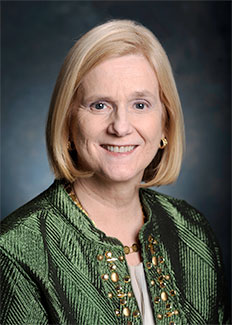 Teena McGuinnessThe University of Alabama at Birmingham School of Nursing is partnering with the Birmingham Veterans Affairs Medical Center on a residency program for mental health nurse practitioners designed to put more nurse practitioners into the VA pipeline and address the mental health needs of a growing veteran population.
Teena McGuinnessThe University of Alabama at Birmingham School of Nursing is partnering with the Birmingham Veterans Affairs Medical Center on a residency program for mental health nurse practitioners designed to put more nurse practitioners into the VA pipeline and address the mental health needs of a growing veteran population.
The program, created by a three-year pilot grant from the Veterans Health Administration Office of Academic Affiliation to the Birmingham VAMC, is one of only four in the country.
“This is uncharted territory, and there is no blueprint for a program such as this,” said Teena McGuinness, Ph.D., professor of nursing, interim department chair and UAB coordinator for the pilot program. “But, it’s imperative to go forward because we absolutely need to meet the mental health care needs of our veterans.”
Cynthia Cleveland-Harris, DNP, chief nursing officer for the Birmingham VAMC, says the yearlong residency is open to certified mental health nurse practitioners who have graduated within the past 12 months. The residents work Monday through Friday, 40 hours per week, and rotate through eight different interprofessional teams — made up of psychiatrists, social workers, psychologists, pharmacists and other health care professionals — treating a variety of mental health issues including PTSD, substance abuse and chronic mental illness. The residents will spend a month with each team and learn more about working with these disorders, as well as how to work with other mental health care professionals.
“The VA has many services to address the mental health needs of veterans, including those recently deployed in combat zones,” said Ehtsham Haq, M.D., chief, mental health service, Birmingham VAMC. “Because of this, VA medical centers are a rich, interprofessional learning environment.”
McGuinness says residents learn most about evidence-based therapies — including those in individual and group settings. Though some of what residents experience is similar to what they would face in treating a mainstream population, the manifestations and symptoms of many of the mental health issues they see are unique to veterans.
| A key criterion to receive this pilot program was for the hospital to be closely partnered with a school of nursing, according to Cynthia Selleck, Ph.D., associate dean for Clinical Affairs and Partnerships and professor in the school. |
“These residents are immersed from the beginning,” McGuinness said. “Once they complete the program, they can enter the workforce confidently, and serve the needs of America’s veterans.”
A key criterion to receive this pilot program was for the hospital to be closely partnered with a school of nursing, according to Cynthia Selleck, Ph.D., associate dean for Clinical Affairs and Partnerships and professor in the school.
“The UAB School of Nursing has had a strong relationship with the Birmingham VAMC for a number of years through quite a number of programs including the VA Nursing Academy, and it was natural for us to partner on this as well,” Selleck said. “Our school is one of the most pro-veteran schools you will find, and this partnership is another step in solidifying our relationship.”
“There are millions of men and women who have served our country in war and peacetime,” said UAB School of Nursing Dean Doreen C. Harper, Ph.D. “Some have seen horrific combat. They all share a powerful bond and distinctive military culture that creates unique health care needs. While our efforts are centered on the Birmingham VAMC, we believe the advances in research and education that are flowing from this partnership can improve care everywhere.”
 Cynthia SelleckThe mental health nurse practitioner residency is the latest in a number of programs the UAB School of Nursing offers or participates in that are geared toward veterans and their families. These include:
Cynthia SelleckThe mental health nurse practitioner residency is the latest in a number of programs the UAB School of Nursing offers or participates in that are geared toward veterans and their families. These include:
- The School of Nursing and the Birmingham VAMC are one of an elite group of VA Nursing Academy sites in the United States, which partners VA Medical Centers with accredited schools of nursing across the nation with the goal of providing compassionate, highly educated nurses to meet the health care needs of America’s heroes.
- The School of Nursing joined the ranks of hundreds of nursing schools and organizations in April 2012 in pledging support to the Joining Forces campaign and is dedicated to educating nursing students on post-traumatic stress disorder, traumatic brain injury, and other unique health care needs of veterans and their families.
- The School of Nursing has a four-year, $1.2 million grant from the Health Services Resource Administration to develop a program, Veterans Career Advancement in Nursing, or Veterans CAN!, to help veterans with military medical experience more easily transition into the nursing profession. The program targets veterans working as patient care technicians, licensed practical nurses or other unlicensed positions and provides them the opportunity to earn a bachelor’s degree in nursing. It offers a number of benefits like giving students course credit for skills that include starting an IV and taking basic vital signs, skills all undergraduate nursing students are required to demonstrate and would have been mastered in the students’ military roles.
- A DVD developed by the School of Nursing and the Birmingham VAMC, which contains three clinically relevant mental health scenarios for nurses that simulate nurses’ caring for veterans experiencing depression, post-traumatic stress disorder and other mental issues on a typical VA medical-surgical floor. The DVD is accompanied by a guidebook and information necessary for obtaining 1.0 CEU and used by VA Medical Centers nationwide.
- Being a part of the Birmingham VAMC’s role as one of eight VA National Quality Scholars Program sites in the United States, School of Nursing Professor Pat Patrician, Ph.D., and School of Medicine Professor Carlos Estrada, M.D., serve as senior scholars for the Birmingham site. VAQS promotes leadership in quality improvement research and emphasizes interprofessional learning. The program offers fellowships to pre- and postdoctoral nurses and physicians.
- The UAB School of Nursing offers “Caring for America’s Heroes,” a distance-accessible elective course designed to increase students’ understanding of veterans’ health issues and the Veterans Healthcare Administration. Knowledge gained in this course can be applied to the care of veterans across a variety of care settings.
- Working together, the UAB and the Birmingham VAMC have developed and use clinical simulation scenarios to highlight the unique health care needs of veterans. The scenarios include burn, gunshot wound, automobile accident and OB simulations. The benefits of simulation training include practicing and making mistakes in a risk-free environment and identifying sources of error in care processes prior to practice.
The first class of residents entered in January 2014. The second will enter in September 2014. Anyone interested in applying for the residency should contact Audry Gorman, project director in the Birmingham VAMC, at audry.gorman@va.gov.